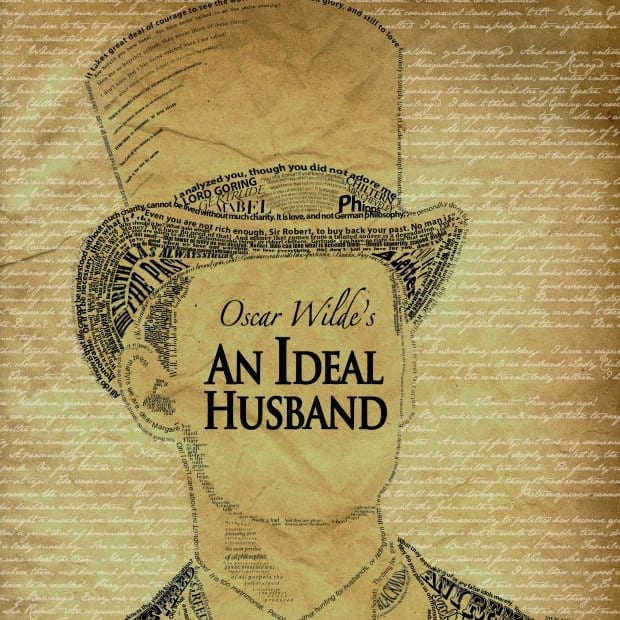PROVO — The Echo Theatre artfully captures Oscar Wilde’s biting wit and cutting social commentary with their production of An Ideal Husband. Add the cast’s excellent timing and physical comedy to the play’s innate merits, and you can expect an evening of brilliant entertainment.

An Ideal Husband is a story of the 19th century English upper class, fraught with drawing rooms and double-dealing. The play opens on a dinner party at the home of Lord and Lady Chiltern where society’s upper crust meet to mingle and complain about their first world problems. The action cuts from conversation to conversation, with clusters of guests strolling in and out of doors and making the audience privy to their always clever, if not substantial, banter.
The guestlist: Lady Chiltern is the dignified hostess whose character is encapsulated in the strict moral code she lives and demands from others. Sir Robert Chiltern intends to play the gracious host, but is quickly waylaid by the unexpected arrival of one Mrs. Chevely who is as corrupt as she is charming. Mrs. Chevely is a visiting friend of Lady Markby’s who, for her part, overlooks any tension her friend might be causing and gabs shamelessly about fashion and travel. Just as shallow, Ladies Marchmont and Basildon are all exasperation at the folly of their having married virtuous, and therefore dull, husbands. The elderly Lord Caversham leaps at any occasion to reproach his son, Lord Goring, who cleverly dismisses every word. While most guests eventually wind up the butt of one of Lord Goring’s jokes, he constantly finds himself coquettishly challenged and matched by Sir Chiltern’s sister Mabel. Many of the guests have agendas and connections unsuspected by the others, and they aim to keep it that way. Intrigue and romance are afoot, and the audience is in for a delightful and always witty ride.
The Echo’s intimate space puts the audience inches from the action, but requires tight execution by cast and crew. The small space requires a minimalistic set, and Matt Boulter makes the most of it with period furniture, rugs, and paintings. The setting is complemented by the actors’ exquisite gowns and suits (designed by Mario Ayala).
I can’t say enough for Alex Barlow’s directing. The actors all seemed to have a natural knack for physical humor, and Barlow milks their talent without ever becoming hackneyed. The actors were all obviously comfortable in their parts and they played well off each other. Perhaps the best example of the actors’ skill, and my favorite moment of the show, was when a sofa collapsed beneath Lady Markby (Jennifer Mustoe) and Mrs. Chevely (Cherie Julander). The two played off the set malfunction without a hitch: Mustoe apologized; the two stood up, shook off their surprise, and continued with the scripted conversation without ever breaking character. All this in the face of uproarious audience laughter.
Each of the characters was a delight, no matter how minor. Joel Applegate mingled his excellent comic timing with the perfect air of aristocratic hauteur in the part of Lord Caversham. Kendra Hill and Kara Henry’s chemistry as Ladies Marchmont and Basildon made me wish their banter would never end. Mustoe had a similar effect with Lady Markby’s airy good humor. And Patrick Newman, as Mason and Phipps, infused both characters with as distinct of personalities as two butlers played by the same person could possibly have and drew laughs with both.
Mrs. Chevely (Cherie Julander) was charismatic and winsome even as she was a little terrifying. Both Lord Goring (Jared Leo Lynton) and Mabel Chiltern (Hailey Nebeker) were played with charm that guaranteed laughs any time they were onstage separately and absolute elation when they were onstage together. Andrea Jakeman played Lady Chiltern with a grace and decorum that infused life into a character that could have easily been a one-dimensional personification of self-righteousness. The only character I felt fell a bit short was Sir Robert Chiltern (Greg Benson), though Benson’s having a cold may have been to blame. Sir Robert Chiltern is a man torn by competing ambition and shame. Benson adequately portrayed the character’s distress without quite capturing the man’s social class and aspirations.
Overall, the play was a joy to behold. The cast made the most of the script and added their own clever flair. I saw the production opening night, and there were a few considerations that still needed to be ironed out (an always out of place rug; the theater’s being situated between two heavily-amped music venues; a lighting malfunction), but none of these distracted from the pleasure of the evening. Which is saying something for everyone involved. In the face of complications and distractions, the cast and crew pulled together a truly lovely evening with an air of professionalism that left me wishing the play weren’t over so soon.
[box type=”shadow”]An Ideal Husband plays at the Echo Theatre (145 N. University Avenue, Provo) every Monday, Tuesday, Friday, and Saturday at 7 PM through September 29, 2012. Tickets are $9-12. For more information, visit www.theechotheatre.com.[/box]
